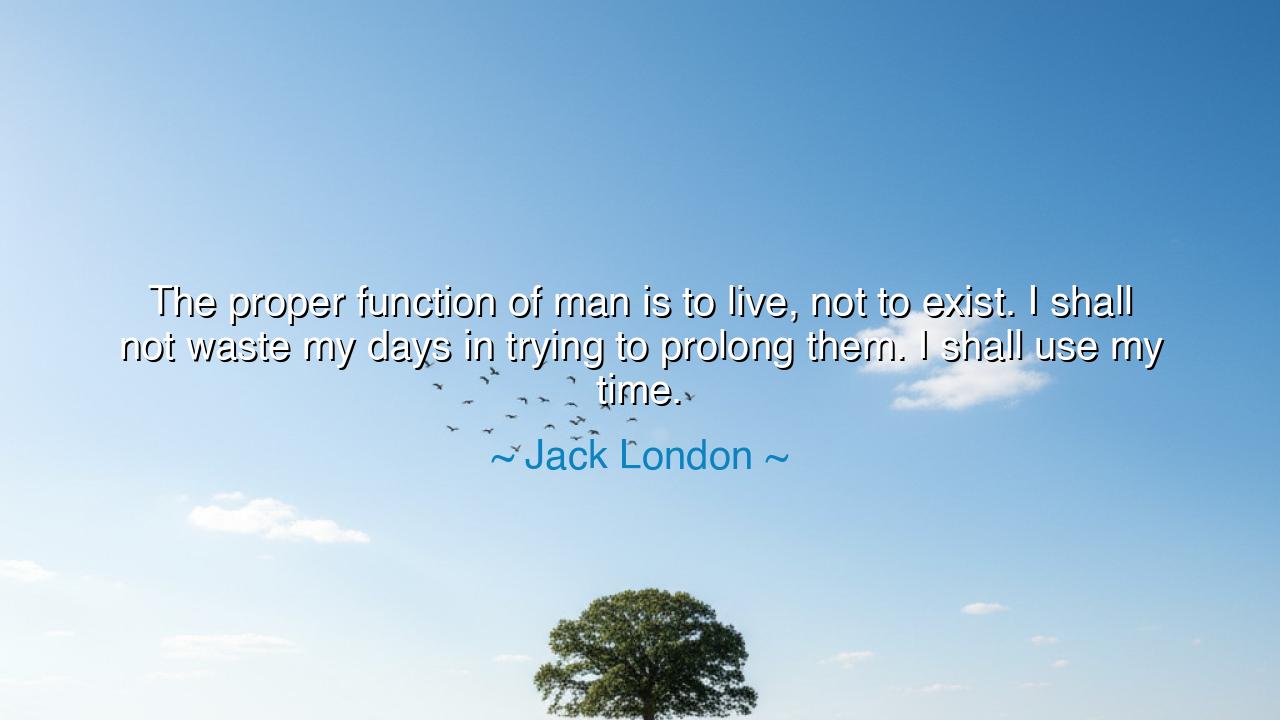
The proper function of man is to live, not to exist. I shall not
The proper function of man is to live, not to exist. I shall not waste my days in trying to prolong them. I shall use my time.






The fiery spirit of Jack London, adventurer and storyteller of the wild, declared with thunderous conviction: “The proper function of man is to live, not to exist. I shall not waste my days in trying to prolong them. I shall use my time.” These words come not from a cloistered philosopher but from a man who sailed seas, roamed frontiers, and wrestled with the raw powers of nature. His voice carries the weight of one who knew that life is not measured in the mere counting of days, but in the fire with which those days are lived.
The origin of this quote springs from London’s philosophy of life, shaped by hardship and daring. Born into poverty, he labored in factories as a boy, voyaged as a sailor, and braved the Alaskan wilderness during the Gold Rush. In his adventures, he saw men clinging desperately to existence, hoarding life as though survival alone was triumph. Yet he also saw others—hungry, cold, and weary—who still dared to sing, to dream, to risk, and to seize the moment with courage. From such contrasts, London forged his creed: the true function of man is to live fully, not to shrink into mere survival.
The ancients knew this truth as well. Did not Achilles, when given the choice between a long life of obscurity or a short life of glory, choose the latter, declaring that it is better to blaze brightly for a moment than to smolder unnoticed for ages? And though his days were few, his name resounds through eternity. So too did London proclaim that it is not the number of days that crowns a life, but the intensity with which they are lived.
Consider also the tale of Alexander the Great. He lived but thirty-two years, yet in that brief span he strode across continents, spreading culture, knowledge, and empire. His life was not prolonged, but it was magnified. Had he chosen mere existence, content to remain a minor king in Macedonia, his name would have vanished into the dust. Instead, he chose to use his time, and in so doing, carved his legacy upon the world.
What lesson, then, lies in London’s words? It is this: to cling to life at the cost of living is no victory at all. One may stretch his years by caution and fear, but what are years without adventure, without love, without creation? To live is to act, to dare, to pour oneself into moments that matter. Existence seeks safety; life seeks meaning. The one avoids risk and gains nothing; the other risks all and gains the fullness of being.
Yet take heed: to live does not mean to squander recklessly, nor to seek constant pleasure. It means to live with intention—to take the talents, the passions, the strength you have, and invest them boldly in the time allotted to you. Whether your field is art, labor, teaching, or leadership, let your work be imbued with vigor. Do not waste your days merely stretching them out like shadows; spend them, as one spends a precious coin, upon what matters most.
In practice, I counsel this: each morning, ask yourself not, “How shall I preserve my life today?” but, “How shall I use my time?” Seek not the easiest path, but the truest. Do one thing each day that reminds you you are alive—create, risk, love, learn, give. And when fear whispers to you, “Stay safe, exist quietly,” answer it with the courage of London: “I shall not waste my days prolonging them. I shall live.”
Thus, O seeker, hear the enduring wisdom: the proper function of man is not mere survival, but life ablaze with purpose. To live is to burn brightly, to use the gift of time with courage and joy. For in the end, the measure of life is not how long the candle burned, but how brilliantly it lit the darkness.






AAdministratorAdministrator
Welcome, honored guests. Please leave a comment, we will respond soon